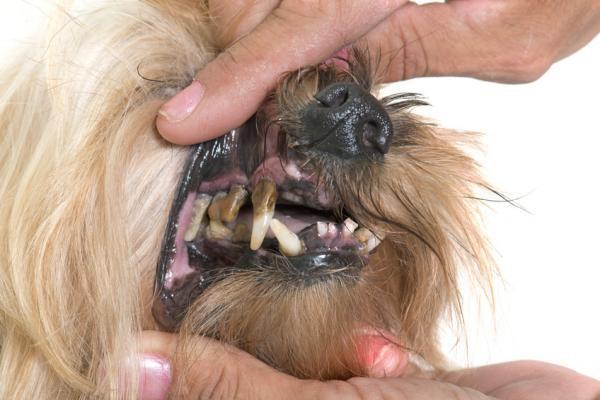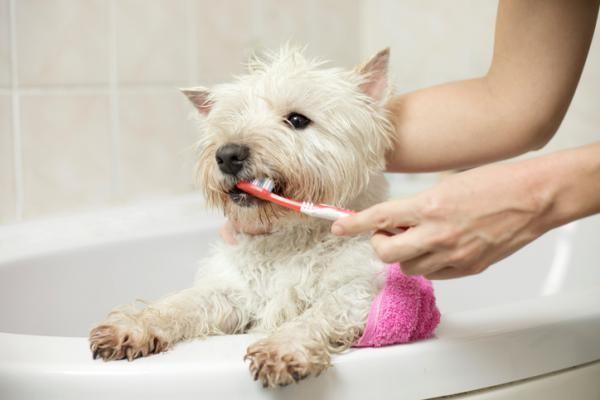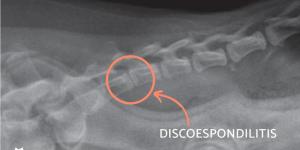Bad Breath in Dogs - Causes, Symptoms and Treatment



See files for Dogs
Bad breath in dogs is a very common problem. We often make the mistake of thinking it is something normal and do nothing about it. However, bad breath in dogs is not only disgusting, it can also be a sign of a health problem. Bad breath in dogs is often simply dismissed as "dog breath", but in reality there is always a reason behind it. If we have noticed that our dog's mouth smells bad, it is very important to find out the cause and get him treated as soon as possible.
The following AnimalWised article describes the main causes of bad breath in dogs, the associated symptoms and their treatment.
Causes of bad breath in dogs
The reasons why your dog has bad breath are many. In most cases, it is temporary and related to something they ate. However, if the bad breath becomes chronic, you need to pay attention, because it can be due to improper or inadequate hygiene, poor nutrition, digestive disorders, etc. Below, we explain the most common causes in more detail:
- Coprophagy: is the technical term for the consumption of feces or excrement. In many cases, it occurs in puppyhood and disappears on its own when the dogs become adults. Nevertheless, it is important to be alert because it may be a sign of a medical or behavioral problem.
- Trauma: Due to a fall or a fight, many dogs suffer broken teeth as well as injuries to the gums or mouth. These are an open gate for the invasion of microorganisms, the action of which can cause bad odors.
- Digestive system disorders: if we notice a foul odor, it is likely that the dog has some kind of stomach issue. This is usually accompanied by other symptoms such as frequent vomiting and loss of appetite.
- Poor feeding: artificial feeds frequently produce a much more unpleasant odor than other types of feeds, such as those based on the ingestion of raw food.
- Diabetes: If you notice an unpleasant smell with a fruity note, the cause is probably that the dog is diabetic.
- Other diseases: Some diseases that affect other organs can cause bad breath in dogs. This is the case with some gastrointestinal, respiratory or metabolic diseases. The odor is produced inside the body, but comes out through the mouth.
Bad breath as a result of dental problems in dogs
Aside from the reasons listed above, dogs with general dental problems are most likely to have bad breath. Two of the most common issues are:
- Gingivitis: Gingivitis, a dental disease that occurs in both dogs and humans, is a disease of the gums in response to plaque and can lead to bad breath. Other effects of gingivitis include redness, swelling, and even bleeding of the gums. Gingivitis is quite common in dogs, with more than 80% of pets over the age of three suffering from this problem. Usually gingivitis can be resolved with good dental hygiene, but if left untreated, it can progress to periodontal disease. Keep reading this other article if you want to know more about gingivitis in dogs.
- Periodontal disease: is a group of dental issues that affect the tissues that support your dog's teeth (the gums and jaw bones). Periodontal disease develops from the appearance of invisible pockets between the dog's teeth and gums where bacteria accumulate. This is the first stage of periodontal disease. Periodontitis causes a lot of pain to dogs and is the main cause of their teeth falling out. Therefore, it is essential to act before it occurs. However, this is not the only consequence of this disease and other pathologies that also cause bad breath. The bacteria that cause these pathologies can reach the bloodstream and develop other damage such as kidney or heart failure, among others. Keep reading this other article if you want to know more about periodontitis in dogs.

Causes of bad breath in puppies
Puppy breath, sometimes called milk breath, occurs mainly during lactation and shortly after weaning of the puppy. The mouth of puppies is generally clean and healthy and does not harbor any of the oral bacteria common in older dogs that might cause bad breath. Puppy breath is completely normal up to 12 weeks of age, and in most cases the breath is not necessarily bad, just noticeable.
If your puppy has bad or unpleasant breath, teething may be the cause. When a puppy is teething, there may be inflammation of the gums that leads to odor. During this time, it is not uncommon for puppies to have smelly breath. However, the problem usually resolves itself once the puppy has all of its teeth. Remember that the baby teeth erupt during the 2nd or 3rd week and fall out during the 12th to 16th week, when the puppy is between 3 and 4 months old.
Symptoms of bad breath in dogs
As mentioned earlier, the reasons for a dog's bad breath are many. This makes it very difficult to determine the cause of bad breath in the first place. However, the first step is to pay close attention to all the other symptoms that accompany bad breath to determine whether or not it is a dental problem. The most common symptoms of dental problems in dogs are:
- Brown or yellow teeth
- Inflamed or bleeding gums
- Loose or missing teeth
- Excessive drooling
- Blood on chew toys or in water bowl
- Preference for one side of the mouth when chewing
- Irritability
- Weight loss
- Decreased appetite
- Problems keeping food in mouth
In general, it is advisable to examine your dog's mouth regularly to determine as soon as possible if your dog might be suffering from dental disease. If you observe any of these symptoms, be sure to inform your trusted veterinarian as soon as possible.
The second most common cause of bad breath in dogs has to do with intestinal issues. If the dog is suffering from intestinal problems, the bad breath is usually accompanied by other very specific symptoms, such as:
- Loss of appetite
- Excessive flatulence
- Vomiting
- Constipation
- Diarrhea
- Difficulty swallowing
If the bad breath is due to something sporadic that the dog ate, it should go away within a few hours. If you find that your dog's bad breath persists for several days, but the dog is not showing any of the above symptoms, it may have something to do with their diet. Try to remember if you have introduced your dog to new foods or if there have been any changes in their regular diet, no matter how small.
Also remember that, just like humans, dogs tend to have bad breath in the morning because they salivate less at night and bacteria build up. Likewise, older dogs tend to produce less saliva, and therefore it is not uncommon for them to have bad breath as they age.
Treatment of bad breath in dogs
Knowing the causes of foul-smelling dog breath is important, but so is knowing how to eliminate it. The cure for bad breath in dogs depends on the cause, but fortunately there are a number of treatment options.
It is best to make an appointment with your veterinarian to determine if your dog is a candidate for a dental cleaning. Your veterinarian will perform a blood test to determine if your dog can tolerate anesthesia. This appointment is also a good time to rule out other possible causes of your dog's bad breath. Depending on the extent of periodontal disease, your veterinarian may need to remove loose or damaged teeth during the cleaning.
Veterinary treatment is needed for diabetes, kidney and liver disease, as well as gastrointestinal problems. Once the underlying issue is corrected, your dog's bad breath should also disappear.
Our discussion of bad breath so far has dealt with bad breath in general. However, if your dog's breath specifically smells like fish, you may find this other article helpful: Why does your dog's breath smell like fish?

Prevention of bad breath in dogs
The easiest way to prevent bad breath in dogs is to brush your dog's teeth regularly. Brushing reduces plaque and promotes better oral hygiene, much like humans. With a little training, most dogs learn to enjoy brushing their teeth. Pet stores and veterinary clinics also carry a variety of products to treat and prevent bad breath in dogs and promote dental hygiene.
- Dental sticks: the dog must take one daily. They contain compounds that eliminate bacteria and bad odors. Also, chewing removes plaque from the teeth and increases salivary secretion.
- Gels: They are applied once a week to reduce bacterial plaque. They usually contain antimicrobial products, such as chlorhexidine.
- Spray toothpastes: Not all dogs tolerate their human brushing their teeth regularly. That's why there are liquid toothpastes on the market that also fight the buildup of bacterial plaque and eliminate bad breath in dogs. These toothpastes can be sprayed directly onto the animal's teeth without the need to rinse them afterwards.
- Mouthwashes: Just as there are mouthwashes that improve breath and clean teeth, there are these products specifically for dogs and cats. They are solutions for daily use that can be mixed with water to facilitate their use.
- Algae: It has been proven that certain algae, such as Ascophyllum nodosum, can reduce bad breath in dogs by up to 60%. Some of these products are marketed in the form of supplements to be mixed with the animal's usual food, while others are offered in the form of snacks or prizes.
- Tablets: As in humans, there are also tablets for bad breath in dogs. However, before using them, you must consult your veterinarian.
All these products are only a supplement to professional dental care, which must be performed by a veterinarian. Also, it is advisable to consult a professional before choosing which product to use.
On the other hand, it should be noted that proper nutrition is also essential for good oral health. To combat the accumulation of tartar and thus prevent bad breath in dogs, dry food is recommended.
This article is purely informative. AnimalWised does not have the authority to prescribe any veterinary treatment or create a diagnosis. We invite you to take your pet to the veterinarian if they are suffering from any condition or pain.
If you want to read similar articles to Bad Breath in Dogs - Causes, Symptoms and Treatment, we recommend you visit our Bacterial diseases category.
- Eubanks, D.L. (2006). Canine oral malodour . Journal of the American Animal Hospital Association, 42(1), 77-79.
- Lobprise, H. B. (Ed.). (2012). Halitosis . In: Blackwell's five-minute veterinary consult clinical companion: small animal dentistry (pp. 207). John Wiley & Sons.







